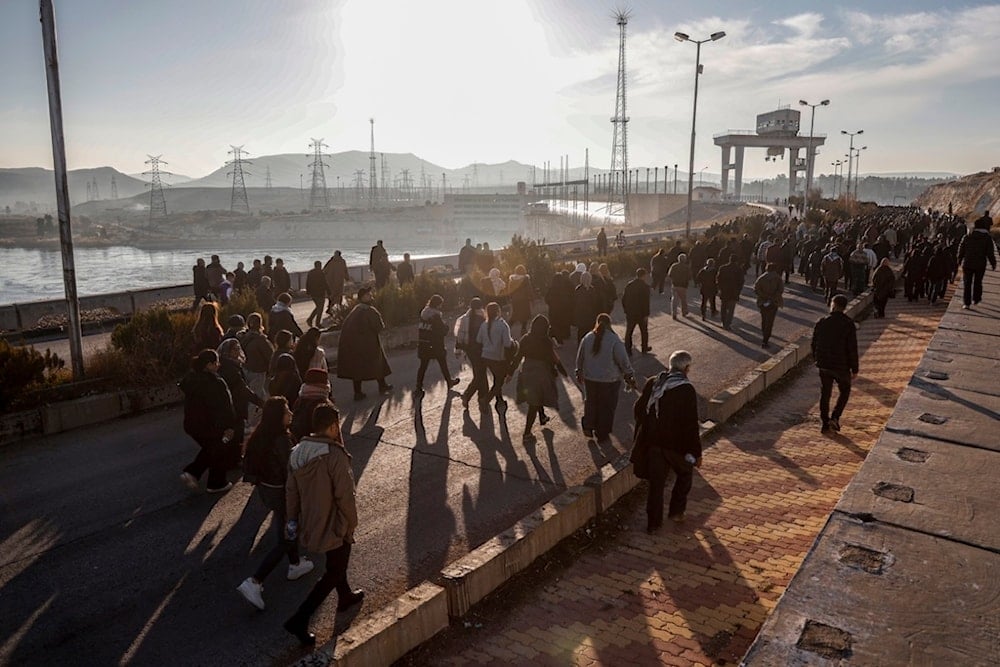Damascus security forces deploy in Tishreen Dam under deal with Kurds
According to SANA, the agreement also provides for the formation of a joint military force to protect the dam and calls for the withdrawal of Turkish-backed factions.
-

Residents of northeastern Syria walk at the Tishreen Dam to join a sit-in demanding an end to the war in the region in Aleppo's countryside, Syria, Wednesday, January 8, 2025 (AP)
Security forces from Syria’s transitional government deployed on Saturday around the strategic Tishreen Dam in northern Syria, under an agreement with the autonomous Kurdish administration, state media reported.
Under the deal, Kurdish-led fighters of the US-backed Syrian Democratic Forces (SDF) will withdraw from the dam, which they captured from the Islamic State (IS) group in late 2015.
The Tishreen Dam, located near Manbij in Aleppo province, is one of several crucial dams along the Euphrates and its tributaries that provide Syria with vital irrigation and hydro-electric power.
On Thursday, a Kurdish source confirmed that the Kurdish authorities in northeast Syria had reached an agreement with the central government regarding the dam’s management. Another Kurdish source told AFP on Saturday that the deal, supervised by the US-led anti-IS coalition, stipulates that the dam will remain under Kurdish civilian administration.
Damascus-SDF accord
Syria’s state news agency SANA reported, "Syrian Arab Army forces and security forces entered into the Tishreen Dam ... to impose security in the region, under the agreement reached with the SDF."
According to SANA, the agreement also provides for the formation of a joint military force to protect the dam and calls for the withdrawal of Turkiye-backed factions "that seek to disrupt this agreement."
The move is part of a broader accord reached in mid-March between interim Syrian President Ahmed al-Sharaa and SDF commander Mazloum Abdi, which was aimed at integrating the institutions of the Kurdish autonomous administration into the national government.
The Tishreen Dam was a key battleground during the war on Syria, which erupted in 2011. It initially fell to rebel forces, was later seized by IS, and eventually recaptured by the SDF.
Peace talks at Tishreen Dam
North Syria's Tishreen Dam hosted a notable visit from a delegation of the US-led international coalition, accompanied by representatives from the Syrian government and the Kurdish-led Syrian Democratic Forces (SDF), as intense helicopter activity from the international coalition covered the skies over the area.
Local sources told Al Mayadeen that the visit aims to solidify an agreement to transfer the management of the dam to the new Syrian government. The meeting also discussed the withdrawal of all armed groups from the dam's vicinity and the establishment of a joint security force for its protection.
The visit follows nearly three months of tension and violent clashes between the US-backed SDF and the Turkish-backed National Army factions. This relative calm may pave the way for broader political movements.
Importance of Tishreen Dam
The Tishreen Dam occupies a critical geographical position, linking three key Syrian governorates: Aleppo, al-Raqqa, and al-Hasakah. This makes it a pivotal strategic hub, overseeing vital supply routes and military movement corridors across northern Syria.
The dam's significance extends far beyond its location or water resources; it serves as a formidable natural barrier, capable of functioning as an advanced defense line against any potential offensive. This enhances its military value, making it a highly contested asset for all parties.
Far from being just a facility for power generation or water storage, the Tishreen Dam has evolved into a powerful symbol of influence and control, central to the broader geopolitical dynamics at play.

 3 Min Read
3 Min Read










